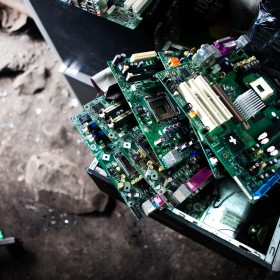How our e-waste industry and certifications are maturing: E-scrap survey findings

Recently, WorldLoop was asked, among 200 other electronics scrap stakeholders, how we feel about the state of the electronics recovery business. The aggregated results of this survey from Arcadian Solutions and Gracestone, were presented on the e-scrap conference in Orlando in September, and provide an interesting insight in some of the current trends and future challenges in the sector. – Findings stated in the survey and article are subjective. The majority of the surveyed companies (80%) are located in North-America.
Picture: Griet Hendrickx
These are difficult times for the e-waste industry sector. Over 75% of the respondents declared that they feel that the sector is either stagnant or declining. The most commonly cited reasons for this are uncertainty in commodity prices and the global market, difficulties in CRT disposal and the changing composition of e-waste. Especially CRT screens remain a pressing issue. They contain a significant amount of lead, making them expensive to recycle, and they cause a major environmental hazard when not recycled responsibly. This survey shows that unfortunately, we’re still not done with them. The good thing is that technology is changing and that incentives to invest in CRT screens are low, so they’re gradually disappearing from the market. Sadly, this also means that incentives to look for efficient CRT recycling methods are diminishing. So the mountain may stop growing, but still needs to decrease.
The pessimistic view towards profitability also makes that companies find it harder to justify maintaining the expense of certifications, Anne Peters from Gracestone said. On the other hand, companies do see value in certifications. 90% of the respondents claimed that certifications greatly or somewhat increase demand in responsible processing and improve the company reputation. Furthermore, certifications lead to good preparation for subsequent audits and increase safety and security.
Where certifications and standards are said to have a positive impact at the company- and operations level, the opposite is being said about their impact on export controls. For example, an astonishing 43% of the respondents declared that they think EPEAT (Electronic Product Environmental Assessment Tool), a method for consumers to evaluate the effect of a product on the environment, is not at all effective. Also other standards, like R2, e-Stewards and the EU legislation WEEELABEX are only slightly considered effective. The most challenging export issues seem to be finding a local vendor instead of exporting, understanding regulatory requirements in other countries and the fact that most companies rely on their downstream vendor to manage this issue. Companies highlight that the credibility of certifications should be increased, standards should evolve and auditor subject matter should be improved.
Because of the disruptiveness of the electronics sector today, we see that the electronics recovery and recycling industry is changing rapidly. Discussions about certifications and design for reuse and recycling are ongoing, regulatory tools such as additional landfill bans and product stewardship are on the rise and there is a search for new technologies to maximize value from smaller products like smartphones. The European Union has made it a priority to work towards a more circular economy, where waste is considered as a resource. It’s true that the challenges in the sector are daunting, but a good framework, pressure on decision makers, decent regulations and increased awareness will encourage reuse, recycling and recovery of materials and allow us to be more sustainable in the way we live and operate.


